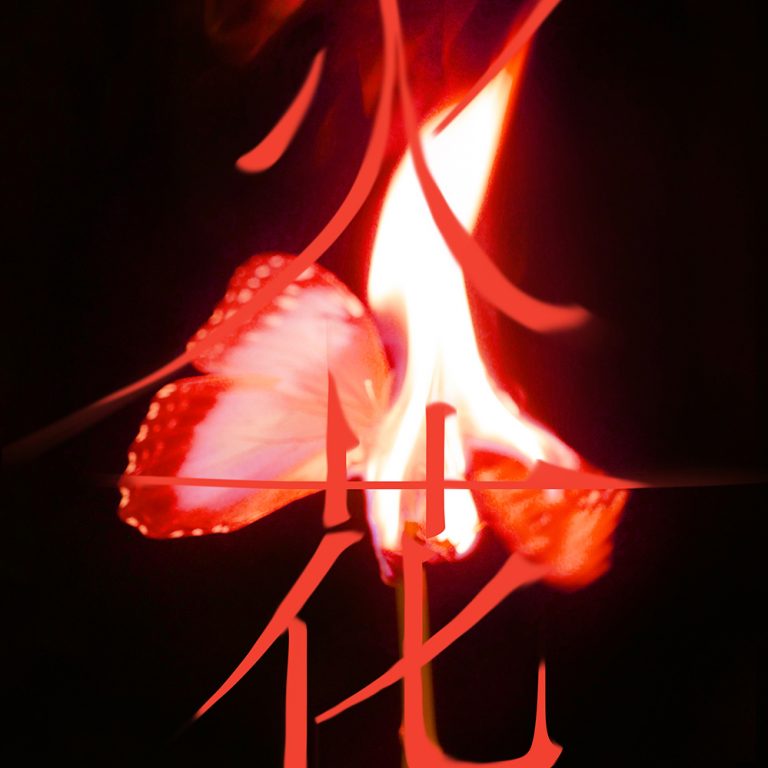Blood being poured across a face, a black-gloved hand reaching towards a scorpion, a back gruesomely slashed across by claws. What connects these seemingly disparate things? They are all elements taken from the music videos of K-Pop girl-group (G)I-DLE, who have consistently delved into the darkness to confront their demons. Frequently showing a sharp edge, the group – consisting of leader (also the primary songwriter and producer of their tracks) Soyeon, along with Minnie, Soojin, Miyeon, Yuqi and Shuhua –musically cut down barriers and stand firm in their shared strength. It is their penchant for badassery, bops and experimentation that has expanded their fanbase with each comeback – and it’s perhaps this reputation that compelled the group to take a left turn for their latest mini-album, I Burn.
Going against expectations, (G)I-DLE’s fourth project trades the group’s typical bombast for moodier, introspective sounds. A true concept record with an overarching narrative, it shows a vulnerable exploration of the emotional fallout of a breakup and the journey to reclaiming oneself.
Although the group are not necessarily strangers to sadness (for example, the underrated ballad “Hear Me” of their first mini-album I Am), it is quite surprising and satisfying to have a new dimension added to their already varying discography. It can be argued that the album is sonically split into two halves, with the first half prioritising atmospheric production while the second half is situated in more direct pop territory – albeit more restrained than their usual fare. This EP also breaks the formula by featuring songwriting and compositions from fellow members Minnie and Yuqi.
I Burn opens with the epic, theatrical “Hann (Alone in Winter)”, which features descending piano chords, strings and the sound of wind. As the beginning point, this song not only succeeds in establishing the project’s concept but also proves a testament to how versatile Soyeon’s songwriting and producing is. Lyrically, the song puts the group in a cold winter where the awakening of resentment is beginning – the typical post-breakup feelings arising towards a person who has abandoned them and the perfect prologue to the following track “HWAA”.
As the lead single from this project, “HWAA” (which translates into ‘Anger’) is similarly unexpected from the group with the central message that “Fire shall bloom a flower.” Over piano, echoing whistles and bouncy rhythm, the song feels like a spiritual sequel to their iconic track “Hann (Alone)” – however, while the older song felt like it took place in the middle of a scorching desert, “HWAA” feels like a winter dusk where the only warmth is from internal rage. The song is bittersweet, simultaneously acknowledging pain but also detailing a cold heart slowly thawing out giving an ultimate message of hope. Although the track ends abruptly, this is still a unique and affecting song that only echoes the loneliness and heartbreak many people are experiencing in our pandemic times.
The project continues with “Moon” – a beautiful, dynamic song about wanting to stay concealed in the darkness to process the wounds that have been inflicted. This track – produced by Minnie – features bewitching production consisting of plucked strings, guitars, organs and synths which culminates in a mystical feel. A highlight on the album, this track details the importance of processing, emphasising that once the anger has been drained away, you are left to deal with the raw emotional aftermath. It is admirable that a group can be so lyrically honest about the post-breakup agoraphobia – the need to stay in your own space to heal after your heart is shattered.
The album gathers some pop propulsion in the second half beginning with “Where Is Love?” – a very apt question asked over funky dance production of synths, basslines and ticking clocks. The song isn’t quite as imploring as one would think; it subverts the expectations of listeners by calling out love and its often paradoxical nature by contemplating: “if love can be so meaningful and great then how does it disappear suddenly without a trace?” Although the song is definitely a bop, it has a very strong element of pathos that encourages a moment of dance-crying.
Following track “Lost” has an introspective, guitar-based pop sound with a smooth beat and was co-written and co-produced by Yuqi. This situates the heartbreak narrative in the stage of acceptance as the members sing “I don’t wanna think about you without you.” It’s about finding the strength to move on while acknowledging that memories and feelings surrounding a failed relationship don’t suddenly disappear.
The album concludes on a victorious note with the vibey “Dahlia” – yet another demonstration of Minnie’s great artistic abilities as a producer and writer – which reveals that the dark period has passed and the group are, despite knowing they could potentially get hurt again, ready to love again. Dahlias can symbolise endurance and inner strength, so it becomes rather ambiguous who the lyrics are directed at. As the members sing about wanting to protect the person hidden behind the “glamour,” it can easily be about somebody else or about self-love. Although this may be considered a spoiler in the narrative, it is affirming to have the final track be an ode to rediscovering love, which gives this project a happy ending.
I Burn is a surprising and emotional project from a girl-group who have sheathed their sharpness to start repairing their internal hurt. The fact that this is not a typical (G)I-DLE release has only further established them as one of the most versatile girl-groups in the industry. It also needs to be emphasised again that these songs are self-produced and self-written by the members themselves, as their output has been for years. By wholly committing to this concept of defeat and resurrection, they have created a project that is not only relatable and inspiring to listeners, but also an exercise in transparency from the group itself.

